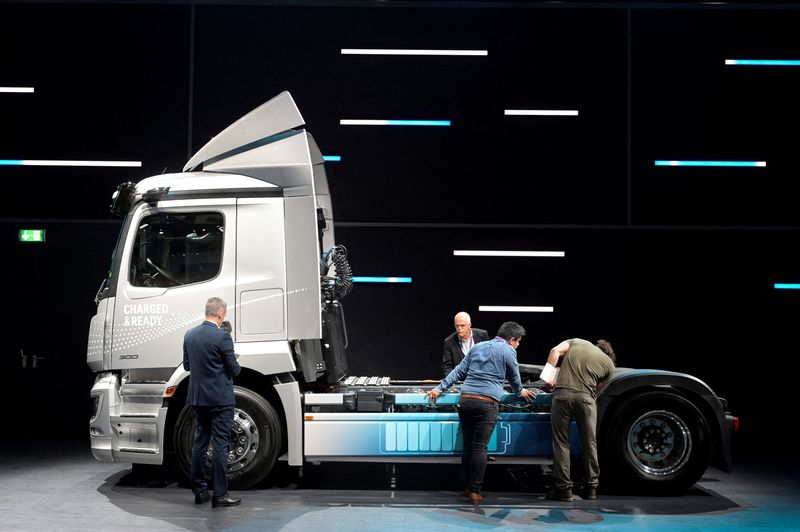By Victoria Waldersee
BERLIN (Reuters) -Daimler Truck reported a 27% jump in third-quarter unit sales to nearly 135,000 on Friday as the chip shortage eased, but warned underinvestment in other parts of the supply chain was still causing shortages of everything from nuts and bolts to tyres.
"Overall the supply chain is somehow broken," Chief Financial Officer Jochen Goetz told analysts. "The market picked up super quickly .... The investments not taken a few years back mean some smaller suppliers are not able to ramp up as fast as we need to."
Of the around 25 types of chips Daimler (OTC:DDAIF) Truck needed which were in short supply, some were now back in the market while for others the company had found alternatives, Goetz said. However, some would remain hard to get throughout 2023.
Still, it is not just chips that are the problem: "It's everything," the CFO explained, "from electric parts to tyres, nuts and bolts... and this will continue as long as we see super strong demand."
The company, which was spun off from Mercedes-Benz last year, raised its outlook in October for full-year revenues to 50 billion to 52 billion euros ($51 billion to $53 billion) from 48 billion to 50 billion euros and said it expected earnings to be 5% to 15% above last year's level rather than unchanged, as previously forecast.
The jump in earnings was highest in Europe at 316% from the same quarter last year, compared with 111% in North America, traditionally Daimler Truck's strongest market.
Hitting the truck and bus maker's target of reducing fixed costs 15% from 2019 levels by 2025 was more challenging in today's inflationary environment, Goetz said.
Incoming orders were down 18% on a year before in the three months ended Sept. 30, and down 14% this year so far, a statement showed.
The company was restricting its acceptance of orders in Europe next year to have some room to pick and choose which orders were best for margins, Goetz said, but in the United States books were open for the full year.
Higher pricing, favourable exchange rate effects and a strong after-sale business pushed revenues up 47% and adjusted earnings before interest and taxes up 159%, Friday's statement showed, confirming results released in an ad-hoc statement in late October.
In Asia, however, where a depressed Chinese market prompted the company to lower its regional adjusted earnings margin last quarter to 1% to 3% from 3% to 5%, earnings fell 63% even as revenues and unit sales increased.
This was partly due to restrictions in Japan on increasing prices on existing orders, Goetz said.
Sales of Daimler Buses, which did not grow at all in 2021, are up 18% this year so far and the company expects the coach market to bounce back in 2023.
($1 = 0.9772 euros)
